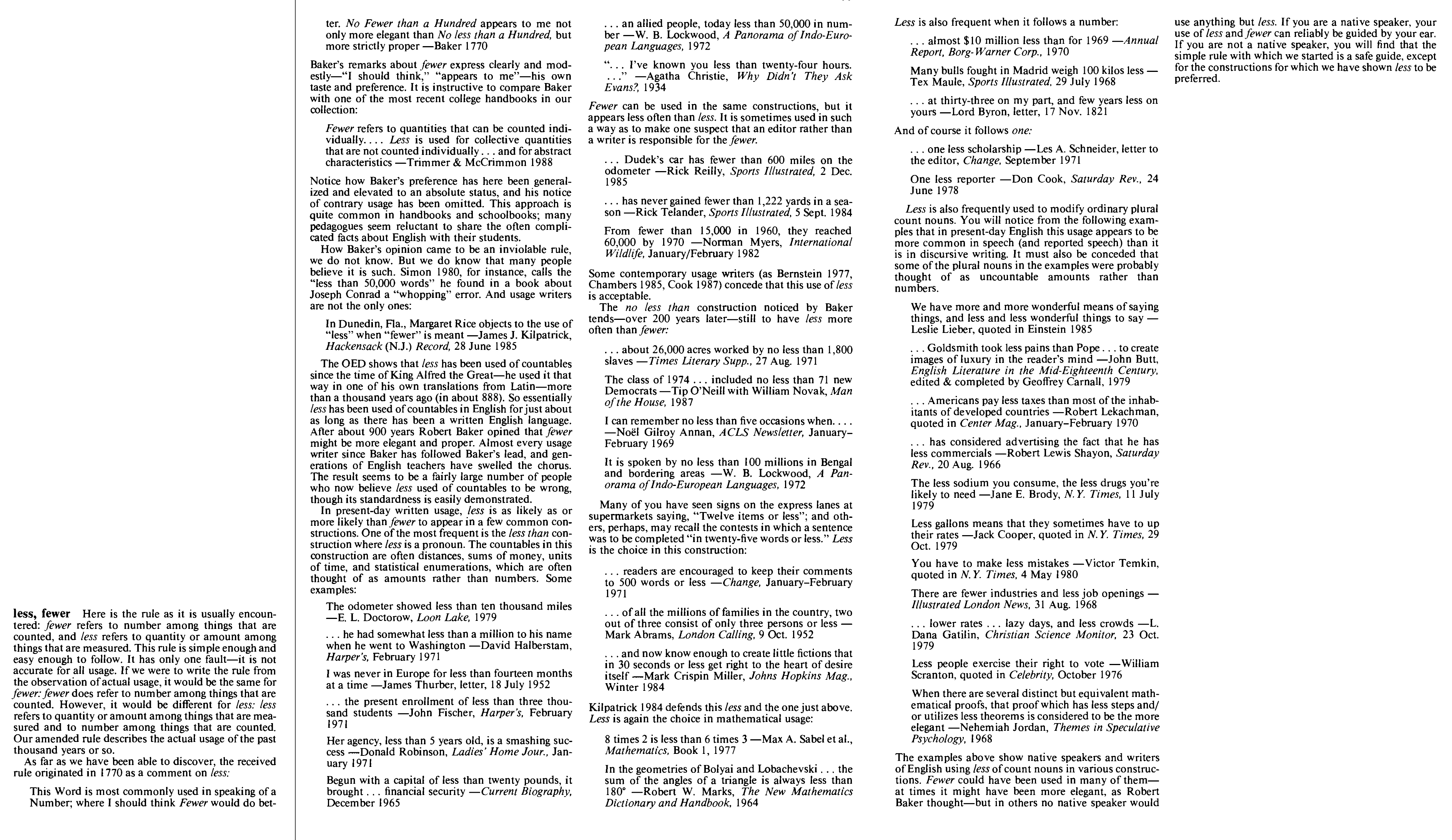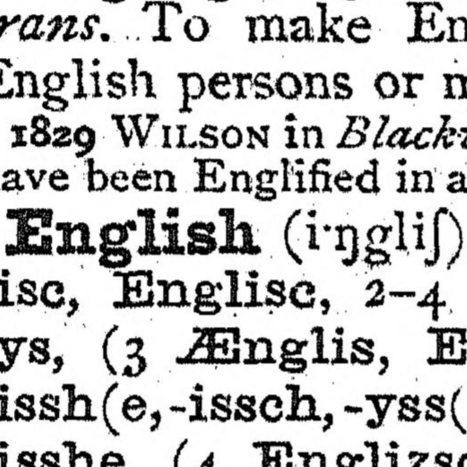Of course the official rule is that for countable things, like apples, we say fewer, as in, “Why are there fewer apples?” And for things that you can’t really count, you use less, as in “We need more dream time and less screen time.”
But recently, even from native speakers who’ve been to university, you can hear people using ‘less’ when the grammar books say they should use ‘fewer’. Language changes and there are many examples of things that we say differently than we write. What are your thoughts?
Should we grammar nazi this until everyone gets back in line? Should we just let language evolve and enjoy the ride? Do you think it will settle in with spoken and written forms being different? Do you think this will become the norm in English?
By the way, I blame supermarkets with their “9 items or less” signs.
I went my whole life learning to use “less”.
Not just signs in stores, but math and general computer use. “Less than & greater than”, for example. I have been into programming since the 1990s, so less than / greater than was a common calculation to perform.
I was in my 30s when someone told me about the word fewer.
In programming, I’m sure that if you knew the exact amount of something was fewer than another amount, you still use less than to check.
I know to use the word “fewer” in speech.
It seems that ‘less than’ from math is referring to less value, which is uncountable. That one checks out.
Integers are countable too. I think in math one just pronounces
<as ‘less than’it’s not integers though, it’s value. 3 < 5: the value of three is less than the value of five. it mirrors 8 > 5 (the value of eight is greater than the value of five). less/greater, fewer/more.
Not sure I follow: isn’t the value of three just “three”, and therefore, “the value of three is less than the value of five” reduces to “three is less than five”? My point was that even though integers represent countable objects – and therefore would have fitted fewer/more better according to the “rule” – no one in a math context would say “three is fewer than five”. The relationship represented by “<” is simply pronounced as “less than” without much concern to the “rule”.
isn’t the value of three just “three”, and therefore, “the value of three is less than the value of five” reduces to “three is less than five”?
yes, but my point is grammatically it refers to the value. 7 is countable (three 7s is 21) but values are uncountable (sort of)
it’s not without concern for the rule, it’s actually following the rule; just the rule gets a bit hard to follow around fungible things like numbers
Thanks for the clarification, I see you are making a distinction between the symbol 7 and the value 7. Then yes I was talking about the value.
At the risk of drifting off topic, I would still argue that integer values are closer to “countable” than “uncountable” – in fact the mathematical notion of “countable” is defined as having one to one correspondence to integers, and is based on the intuition of integers representing the counting of objects. I do concede though that people have different intuitions and intuition is a tricky thing (I myself would consider the value of 2/3 or 3.14 to be closer to being “uncountable”, but mathematically the set of rational numbers is considered countable, intuitively you just need to count in unit of 1/3 or 0.01, respectively)
okay yeah, i don’t really know how to explain my position as i’ve always seen this as axiomatic
in fact the mathematical notion of “countable” is defined as having one to one correspondence to integers
i would say linguistics are probably different to mathematics then, as countability is unrelated to integer correspondence. three and a half apples is obviously countable, but doesn’t correspond to any integer.
linguistic countability is more related to whether an item can be treated as plural (some apples) or not (some milk)
you could say “six apples are on the table”, whereas “six are divisible by three” sounds just as stupid as “milk are made by cows”. so in this case 6 (the value) is uncountable.
integer values are closer to “countable” than “uncountable” – in fact the mathematical notion of “countable” is defined as having one to one correspondence to integers
but mathematically the set of rational numbers is considered countable
also is this not contradictory? or do you mean correspond as in each number can be assigned to an integer?
The supermarket express lane signs really bother me 😅 Like, come on, you want people to buy things from you, you put your best, most professional foot forward and use “fewer”! But in general, confusing “less” and “fewer” in conversation doesn’t bother me and I most definitely am not blowhard enough to correct anyone on it. Different if we’re talking about something formal, like written assignments, lab reports, term papers, work reports, or grant proposals where we’re trying to be taken seriously.
In the UK, we have Waitrose supermarkets, which have a “10 items or fewer” lane. The rest are “N items or less”. I wouldn’t go out of my way to find a Waitrose – they are fewer and further between than other kinds – but I certainly appreciate it when I shop at one and buy a small number of items.
Likewise, with general usage and mis-usage of “less”, I wouldn’t go out of my way to correct anyone, but I enjoy it when “fewer” is used correctly. And I do so myself, of course!
These sorts of shifts in language seem inevitable, and always seem to be in the direction of a decline in precision. But I wonder if that perception is just a cognitive bias: perhaps interesting and exciting words are emerging but we’re less likely to spot them until they themselves begin to decline in precision?
I’m curious, have you rejected a grant proposal (effectively) because it used one “less” too many? 😅
Hahah I’ve never been on the reviewing end, thankfully. I figure it’s like job applications, you don’t want to be the one who gets thrown out because of a stupid quirk of the reader.
Both are technically correct. But the use of “less” when “fewer” is more appropriate triggers me more than it probably should.
Well, technically, in formal writing ‘less’ is incorrect. Do not use it if you want to come across as educated. It can be considered correct in casual speech because once something is common, we really can’t call it incorrect, but using it will have social implications when you are being judged on language.
It can be considered correct in casual speech because once something is common, we really can’t call it incorrect
Well, yes. That’s generally what I meant. I’m basing it off of the Merriam-Webster definition
https://www.merriam-webster.com/words-at-play/fewer-vs-less
For the most part, in common usage, the two have become unfortunate synonyms, like literally and figuratively have (ugh).
I almost always hear less anymore. It irks me, but language necessarily evolves. As far as I can tell, at least in my area of the south eastern U.S., less is the norm. I hope that few(er) does not become totally obsolete.
Any particular reason why this post is duplicated?
It didn’t appear to be processing and I F5ed it and started again. I think that was it.
I suspected that, happened to me too, when some Lemmy instances were overloaded. No biggie: if the two comments from the other duplicate are reposted here, I’ll delete that one; otherwise we leave it there.
I’ve found that it happens less often on Chrome than it does on the Brave browser.
Were you raised in a sewer?
I had not heard that one. Hehe.
The Oxford English dictionary also gives one definition of less as fewer, but with a warning:
A.1.c A smaller number of; fewer. This originates from the OE. construction of lǽs adv. (quasi-n.) with a partitive genitive. Freq. found but generally regarded as incorrect.
Gilman’s Webster’s Dictionary of English Usage gives an insightful and (as usual) witty discussion. I paste it here as an image:

The line from 1770 says a lot. It appears this has been an issue for a long time. Maybe the pendulum will swing the other direction later.
“No fewer than a hundred appears to me not only more elegant than no less than a hundred, but more strictly proper.”








